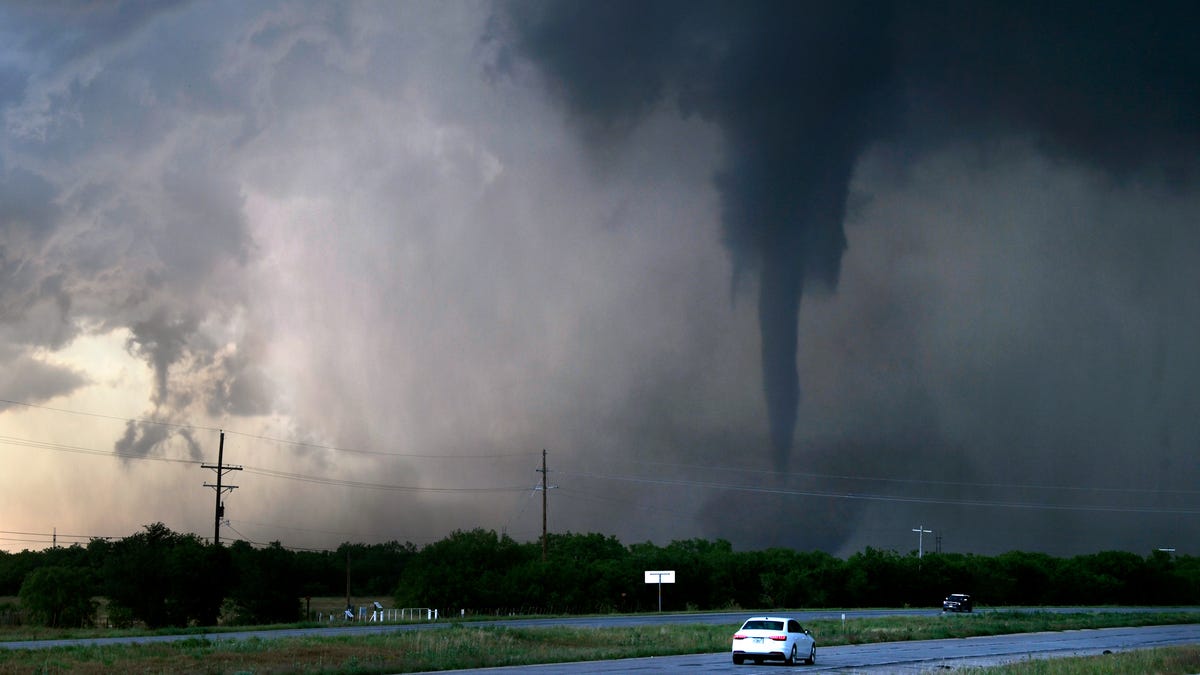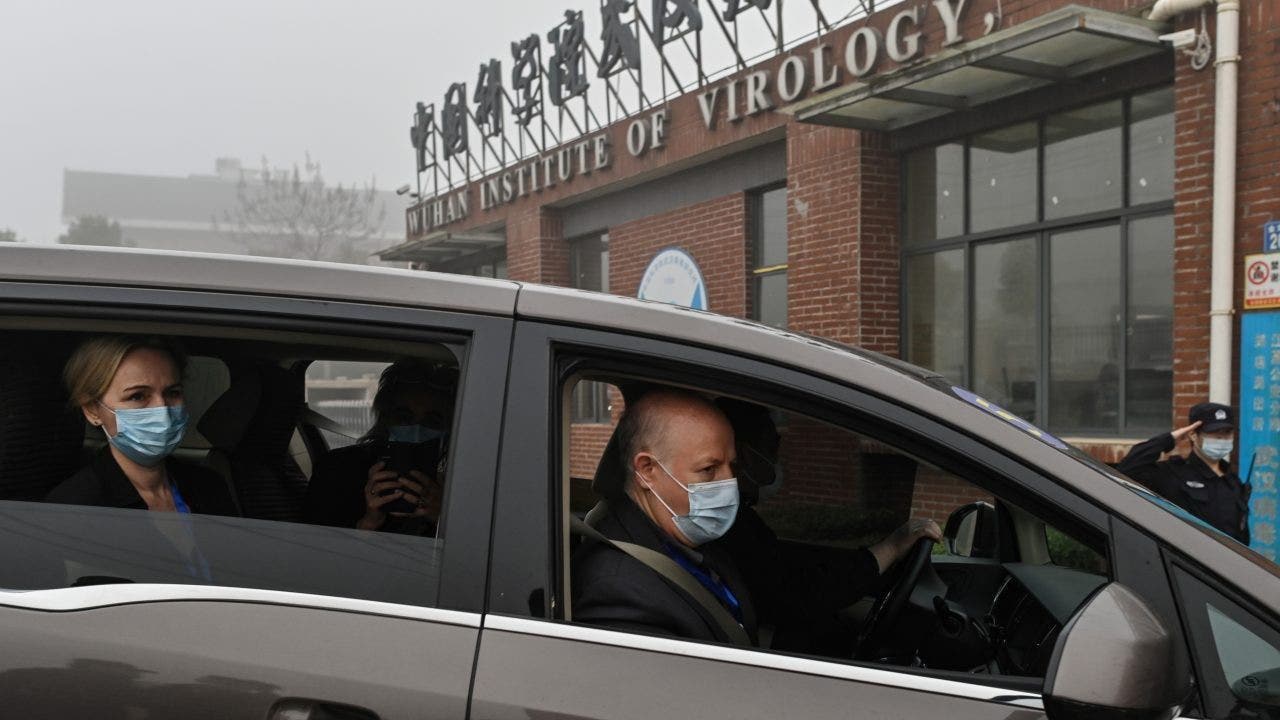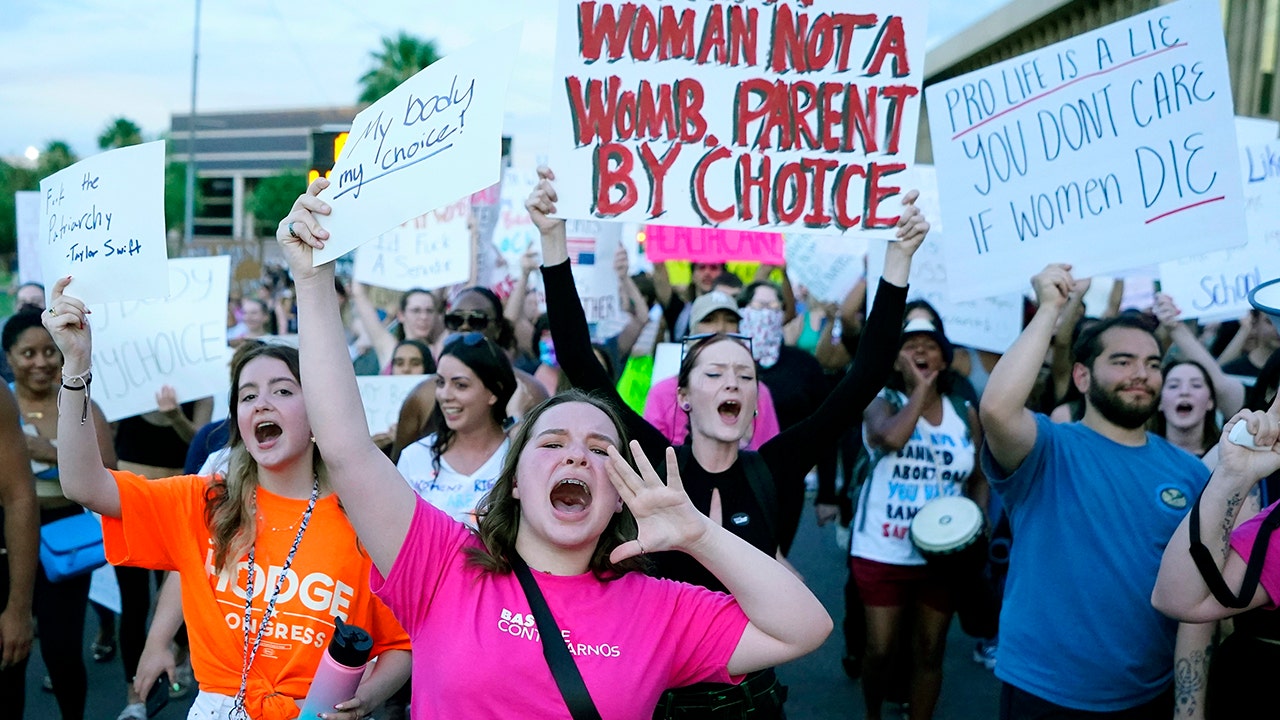World
Russia-Ukraine war: List of key events, day 538
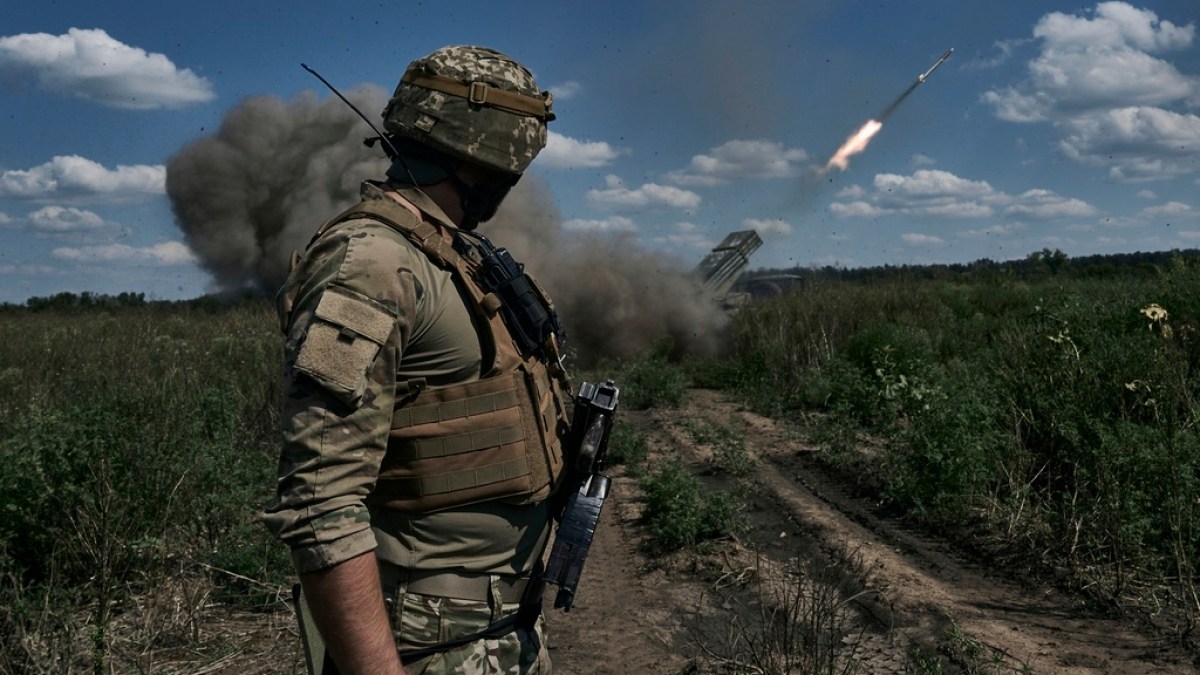
Here is the situation on Tuesday, August 15, 2023.
Fighting
- Ukraine downed three waves of Russian missiles and drones targeting Odesa, the army said. Fifteen drones and eight Kalibr-type sea-based missiles were involved in the attack. Falling debris from the destroyed weapons damaged a student dormitory and a supermarket in Odesa’s city centre, leaving three workers wounded.
- Russia said its air defence systems shot down unmanned aerial vehicles over its Belgorod region, the TASS news agency reports. It said there were no casualties or damage.
- Russian Defence Minister Sergei Shoigu said Russian weapons were proving their effectiveness in the war against Ukraine and that “much-hyped” Western arms had shown themselves to be “far from perfect”.
- Ukraine reported fierce fighting along its entire front line and claimed “some success” in pushing back Moscow’s troops in the southeast of the country. Deputy Defence Minister Hanna Maliar said Ukrainian troops had pushed forward around the village of Staromaiorske, about 97km (60 miles) southwest of Russian-held Donetsk, and were pressing on two fronts in the south.
- A Russian spokesperson in Ukraine’s Kherson region accused Kyiv’s forces of attacking a monastery in the village of Korsunka as well as a school, TASS reported.
- Russia is equipping its new nuclear submarines with hypersonic Zircon missiles as part of the country’s efforts to boost its nuclear forces, the RIA state news agency reported, quoting Alexei Rakhmanov, chief executive officer of the United Shipbuilding Corporation (USC). Yasen-class submarines, also known as Project 885M, are nuclear-powered cruise missile submarines built to replace Soviet-era nuclear attack submarines as part of a programme to modernise Russia’s fleet.
Economy
- The Russian rouble slid past 100 against the dollar, its lowest level since March 23, 2022. The rouble has shed about 30 percent of its value against the dollar as imports rise and exports decrease since the full-scale invasion of Ukraine last year. On Monday morning, data from the Moscow Exchange showed the rouble trading at 101.01 to the dollar, while against the euro, it fell to a near 17-month low of 110.73.
Military aid
- The United States will send Ukraine new military assistance worth $200m. The package includes air defence munitions, artillery rounds, anti-armour capabilities and mine-clearing equipment, US Secretary of State Antony Blinken said in a statement.
- Ukrainian President Volodymyr Zelenskyy thanked the US for its decision to send Kyiv the assistance package.
- Ukrainian Prime Minister Denys Shmyhal thanked Germany’s finance minister and government for their support in financial aid and sanctions against Russia.
- Ukrainian presidential adviser, Mykhailo Podolyak, said the provision of long-range missiles, such as the German Taurus missiles Kyiv has asked for, would reduce Russia’s combat capabilities by focusing on “the destruction of rear logistics – warehouses, transportation, fuel”.
Diplomacy
- Chinese Defence Minister Li Shangfu will visit Russia and Belarus this week. “State Councillor and Defence Minister Li Shangfu will go to Russia to attend the 11th Moscow Conference on International Security, and visit Belarus,” a Chinese defence ministry spokesperson said.
- Russia’s Ministry of Foreign Affairs said employees of Russian institutions in Moldova – the embassy, trade mission and Russian Centre of Science and Culture – as well as their family members have returned to Moscow. Last month, Moldova told Russia to reduce its embassy presence in Chisinau, citing concerns about alleged Russian attempts to destabilise the small state, which borders Romania and Ukraine.
Politics
- US Ambassador to Russia Lynne Tracy met with jailed Wall Street Journal reporter Evan Gershkovich in her third such visit since his March detention in Russia on espionage charges, which he denies, according to the newspaper.
- An ally of Russian opposition leader Alexey Navalny is on trial in Siberia on charges of creating an “extremist organisation”, a court spokeswoman told France’s AFP news agency. Ksenia Fadeyeva, 31, is a former municipal deputy in the Siberian city of Tomsk and headed Navalny’s political office in the city.
Espionage
- A major general in Ukraine’s security service has been sentenced to 12 years in prison for high treason, the German press agency, dpa, reported. The intelligence officer was accused of collecting information and passing it on to Russia, the public prosecutor’s office in Kyiv said.
- Poland’s Interior Minister Mariusz Kaminski announced that two Russian citizens found “distributing propaganda materials of the Wagner Group” have been detained in Warsaw and Krakow. “Both were charged with … espionage and arrested,” Kaminski said on social media.
Black Sea tension
- Ukraine condemned what it called “provocative” Russian actions a day after a Russian warship fired warning shots at a cargo vessel in the Black Sea.
- Romania aims to double the monthly transit capacity of Ukrainian grain via the Danube River, the country’s Transport Minister Sorin Grindeanu said. Romania could increase Danube River transit capacity by hiring more staff to ease the passage of vessels and finalising connecting infrastructure projects, Grindeanu told reporters. Before Russia pulled out of the Black Sea grain deal, the Danube ports accounted for about a quarter of Ukraine’s grain exports.
Regional security
- The United Kingdom said its fighter jets intercepted two Russian maritime patrol bomber aircraft in international airspace north of Scotland, a NATO policing area. The UK said its Typhoon jets routinely scrambled during such incidents to secure and safeguard its skies.
- Russia’s Ministry of Defence said it scrambled a MIG-29 jet after a Norwegian air force plane neared Russian airspace off its Arctic coast. Separately, the ministry said Russian strategic bombers carried out routine flights over international waters in the Arctic.
- Russia will deliver S-400 anti-aircraft systems to India within an agreed timeframe, the Russian Interfax news agency quoted a senior Russian defence export official as saying. India is the world’s biggest weapons importer and still primarily uses Russian technology for arms, but officials have expressed concern that Russia’s war in Ukraine could delay deliveries.

World
Norwegian Islamist wanted over deadly shooting at LGBTQ+ festival is being sent back from Pakistan

COPENHAGEN, Denmark (AP) — A radical Norwegian Islamist who is suspected of complicity in the deadly shooting at an LGBTQ+ festival in Oslo two years ago has been expelled from Pakistan and is on his way to Norway, the Scandinavian country’s government said Friday.
Two people were killed and nine seriously wounded in the shooting at three locations, chiefly outside the London Pub, a popular gay bar in Oslo’s nightlife district, on June 25, 2022.
Arfan Bhatti, who is to land in Oslo later Friday, allegedly posted statements online about killing gay people, Norwgian media have said.
Bhatti knew Zaniar Matapour, the main suspect in the attack that the Norwegian Police Security Service has called an “Islamist terror act.” Matapour has since March been on trial in Oslo for the shooting, accused of terrorism.
A Norwegian citizen born in Oslo to Pakistan immigrants, Bhatti who has a past in criminal gangs, was a leading figure in radical Islamic circles in Norway for years, chiefly known as the leading figure in an Islamic State-affiliated group in the country.
The 46-year-old was not in Norway in 2022 but likely in Pakistan, Justice Minister Emilie Enger Mehl said. His role in the 2022 shooting was unclear and Norwegian police have said that with Bhatti’s return to Norway, they “want to continue with the extensive investigations to shed light on what involvement Bhatti may have had in the attack.”
“No matter where in the world someone is, they should know that the Norwegian authorities are doing everything we can to bring them to Norway,” Enger Mehl told a press conference.
Norwegian police said that although there is no extradition agreement with Pakistan, Pakistani authorities have made it possible “to complete the investigation into the terrorist case.”
Upon arrival in Norway, Bhatti will be detained and face a custody hearing during the weekend, police said.
Bhatti could be called upon testifying in the trial at the Oslo District Court against Matapour. Bhatti’s lawyer John Christian Elden said his client has nothing to do with the 2022 shooting.
”Whether he is guilty is up to the legal system to decide,” Enger Mehl said.
Matapour, a Norwegian citizen originally from Iran, allegedly fired 10 rounds with a machine gun and eight shots with a handgun into a crowd before being detained by bystanders. Following the attack, a Pride parade was canceled, with police saying they couldn’t guarantee security.
Matapour who had sworn allegiance to the Islamic State group, has refused to speak to investigators. If found guilty, he faces 30 years in prison.
World
War-scarred village in Ukraine finds solace in vibrant new church
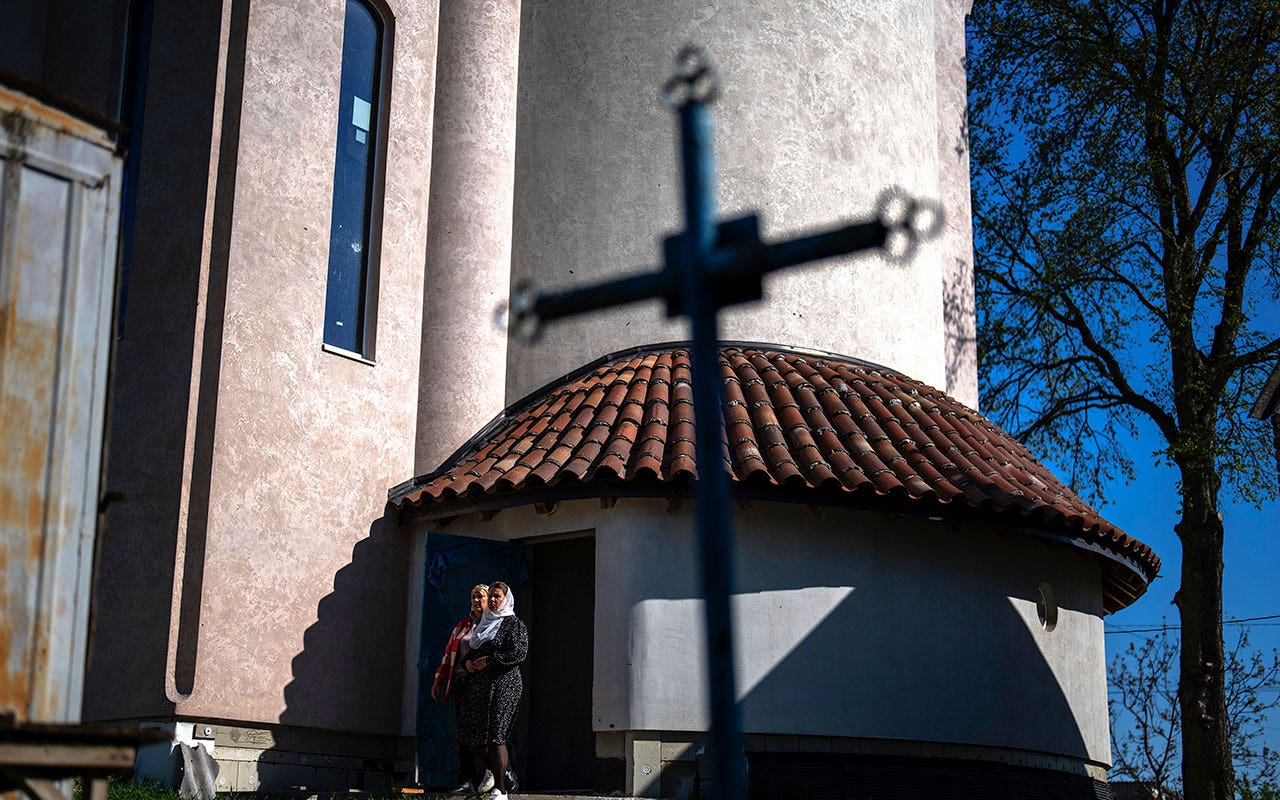
- The Church of the Intercession of the Blessed Virgin Mary in Lypivka sheltered nearly 100 residents during the 2022 Russian occupation.
- The church, with a history spanning more than 300 years, halted construction during the 2022 invasion but has since resumed.
- The majority of Ukrainians identify as Orthodox Christians, with the Lypivka church affiliated with the independent Orthodox Church of Ukraine.
This Orthodox Easter season, an extraordinary new church is bringing spiritual comfort to war-weary residents of the Ukrainian village of Lypivka. Two years ago, it also provided physical refuge from the horrors outside.
Almost 100 residents sheltered in a basement chapel at the Church of the Intercession of the Blessed Virgin Mary while Russian troops occupied the village in March 2022 as they closed in on Ukraine’s capital, Kyiv, 40 miles to the east.
“The fighting was right here,” the Rev. Hennadii Kharkivskyi said. He pointed to the churchyard, where a memorial stone commemorates six Ukrainian soldiers killed in the battle for Lypivka.
KYIV’S FORCES ARE UP AGAINST A CONCERTED RUSSIAN PUSH IN EASTERN UKRAINE, A MILITARY OFFICIAL SAYS
“They were injured and then the Russians came and shot each one, finished them off,” he said.
Christian Orthodox worshippers leave the chapel basement after attending a service at the Church of the Intercession of the Blessed Virgin Mary in Lypivka, near Lviv, Ukraine, on April 28, 2024. (AP Photo/Francisco Seco)
The two-week Russian occupation left the village shattered and the church itself — a modern replacement for an older structure — damaged while still under construction. It’s one of 129 war-damaged Ukrainian religious sites recorded by UNESCO, the United Nations’ cultural organization.
“It’s solid concrete,” the priest said. “But it was pierced easily” by Russian shells, which blasted holes in the church and left a wall inside pockmarked with shrapnel scars. At the bottom of the basement staircase, a black scorch mark shows where a grenade was lobbed down.
But within weeks, workers were starting to repair the damage and work to finish the solid building topped by red domes that towers over the village, with its scarred and damaged buildings, blooming fruit trees and fields that the Russians left littered with land mines.
UKRAINE’S ZELENSKYY URGES FASTER US WEAPON DELIVERIES
For many of those involved — including a tenacious priest, a wealthy philanthropist, a famous artist and a team of craftspeople — rebuilding this church plays a part in Ukraine’s struggle for culture, identity and its very existence. The building, a striking fusion of the ancient and the modern, reflects a country determined to express its soul even in wartime.
The building’s austere exterior masks a blaze of color inside. The vibrant red, blue, orange and gold panels decorating walls and ceiling are the work of Anatoliy Kryvolap, an artist whose bold, modernist images of saints and angels make this church unique in Ukraine.
The 77-year-old Kryvolap, whose abstract paintings sell for tens of thousands of dollars at auction, said that he wanted to eschew the severe-looking icons he’d seen in many Orthodox churches.
“It seems to me that going to church to meet God should be a celebration,” he said.
There has been a church on this site for more than 300 years. An earlier building was destroyed by shelling during World War II. The small wooden church that replaced it was put to more workaday uses in Soviet times, when religion was suppressed.
Kharkivskyi reopened the parish in 1992 following the collapse of the Soviet Union, and set about rebuilding the church, spiritually and physically, with funding from Bohdan Batrukh, a Ukrainian film producer and distributor.
Work stopped when Russian troops launched a full-scale invasion of Ukraine on Feb. 24, 2022. Moscow’s forces reached the fringes of Kyiv before being driven back. Lypivka was liberated by the start of April.
Since then, fighting has been concentrated in the east and south of Ukraine, though aerial attacks with rockets, missiles and drones are a constant threat across the country.
By May 2022, workers had resumed work on the church. It has been slow going. Millions of Ukrainians fled the country when war erupted, including builders and craftspeople. Hundreds of thousands of others have joined the military.
Inside the church, a tower of wooden scaffolding climbs up to the dome, where a red and gold image of Christ raises a hand in blessing
For now, services take place in the smaller basement, where the priest, in white and gold robes, recently conducted a service for a couple of dozen parishioners as the smell of incense wafted through the candlelit room.
He is expecting a large crowd for Easter, which falls on Sunday. Eastern Orthodox Christians usually celebrate Easter later than Catholic and Protestant churches, because they use a different method of calculating the date for the holy day that marks Christ’s resurrection.
A majority of Ukrainians identify as Orthodox Christians, though the church is divided. Many belong to the independent Orthodox Church of Ukraine, with which the Lypivka church is affiliated. The rival Ukrainian Orthodox Church was loyal to the patriarch in Moscow until splitting from Russia after the 2022 invasion and is viewed with suspicion by many Ukrainians.
Kharkivskyi says the size of his congregation has remained stable even though the population of the village has shrunk dramatically since the war began. In tough times, he says, people turn to religion.
“Like people say: ‘Air raid alert — go see God,’” the priest said wryly.
Liudmyla Havryliuk, who has a summer home in Lypivka, found herself drawn back to the village and its church even before the fighting stopped. When Russia invaded, she drove to Poland with her daughters, then 16 and 18 years old. But within weeks she came back to the village she loves, still besieged by the Russians.
The family hunkered down in their home, cooking on firewood, drawing water from a well, sometimes under Russian fire. Havryliuk said that when they saw Russian helicopters, they held hands and prayed.
“Not prayer in strict order, like in the book,” she said. “It was from my heart, from my soul, about what should we do? How can I save myself and especially my daughters?”
She goes to Lypivka’s church regularly, saying it’s a “place you can shelter mentally, within yourself.”
As Ukraine marks its third Easter at war, the church is nearing completion. Only a few of Kryvolap’s interior panels remain to be installed. He said that the shell holes will be left unrepaired as a reminder to future generations.
“(It’s) so that they will know what kind of ‘brothers’ we have, that these are just fascists,” he said, referring to the Russians.
“We are Orthodox, just like them, but destroying churches is something inhumane.”
World
UK has begun mass arrests of potential Rwanda deportees: What’s next?
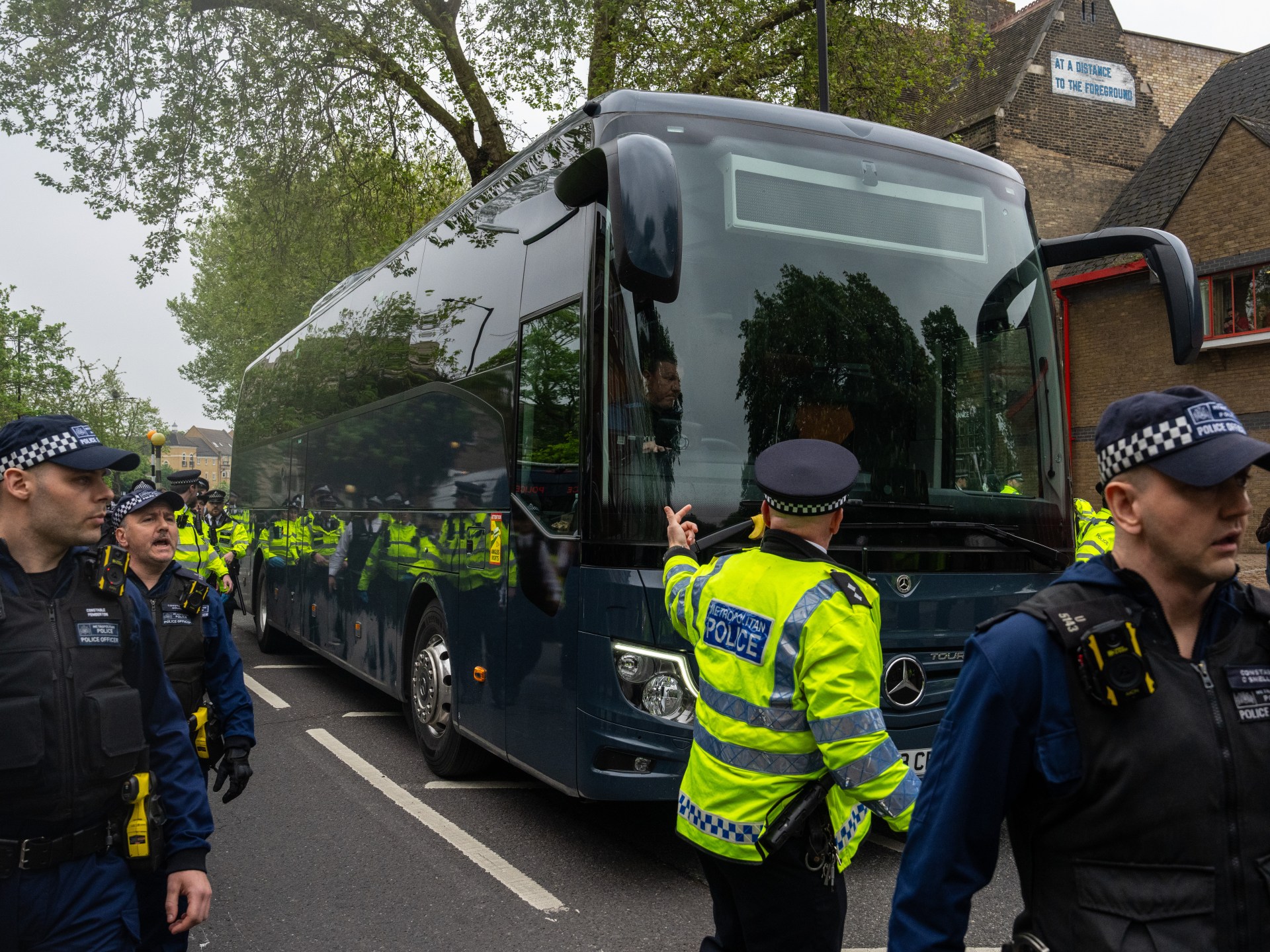
The British authorities have begun a series of operations to detain migrants in preparation for their deportation to Rwanda as part of Prime Minister Rishi Sunak’s flagship immigration policy.
The UK Home Office, which oversees immigration matters in the United Kingdom, released a video on Wednesday showing armed immigration officers handcuffing individuals at their homes and escorting them into deportation vans.
In a statement, it announced a “series of nationwide operations” ahead of the first deportations to begin in the next nine to 11 weeks. Interior minister James Cleverly said enforcement teams were “working at pace to swiftly detain those who have no right to be here so we can get flights off the ground”.
BREAKING: The first people set to be removed to Rwanda have been detained. pic.twitter.com/2WWNhQVC1l
— Home Office (@ukhomeoffice) May 1, 2024
Last month, Parliament approved a controversial law – known as the Safety of Rwanda Bill – that allows for asylum seekers who arrive illegally in Britain to be deported to Rwanda, even after the UK Supreme Court declared the policy unlawful last year.
Sunak, who is expected to call an election later this year, said the flagship immigration policy seeks to deter people from crossing the English Channel in small boats and to tackle the issue of people-smuggling gangs.
Unions and human rights charities have expressed dismay at the wave of arrests so far. While some have succeeded in blocking transfers to removal centres, they say it is becoming increasingly difficult to bring legal action.
Who is being targeted by the campaign of mass arrests?
The Home Office has announced it is carrying out arrests within an initial cohort of about 5,700 men and women who arrived in the UK without prior permission between January 2022 and June 2023. Those who fall within this group have been sent a “notice of intent” stating that they are being considered for deportation to Rwanda.
However, it was revealed this week that government data shows that the Home Office has lost contact with thousands of potential deportees, with only 2,143 “located for detention” so far. More than 3,500 are unaccounted for, with some thought to have fled across the Northern Irish border into Ireland. Others include people who have failed to attend mandatory appointments with the UK authorities. Ministers have insisted enforcement teams will find them.
Several asylum seekers who did attend compulsory appointments with the UK authorities as part of their application for asylum this week have been arrested and told they will be sent to Rwanda.
Fizza Qureshi, CEO of the charity Migrants’ Rights Network, told Al Jazeera that “people are forced to go and report in these Home Office centres and once they are there, there is no guarantee that they’ll come out free”.
The government has not provided exact figures for the number of arrests conducted since the operation started on Monday, but detentions have been reported across the UK in England, Wales, Scotland and Northern Ireland and in cities including Bristol, Liverpool, Birmingham and Glasgow.
Maddie Harris, founder of the UK-based Humans for Rights Network, told Al Jazeera that asylum seekers from war-torn countries including Afghanistan, Sudan, Syria and Eritrea with no connection to Rwanda are being arrested as part of the scheme.
One of the organisation’s clients, a young woman who has been in the UK for almost two years, was arrested as part of the crackdown. “She is absolutely terrified,” Harris said, adding that while the young woman has no connection to Rwanda, she was told she would be deported to the Eastern African country.
According to Humans for Rights Network, individuals who have filled out a Home Office questionnaire over the past two years were also being arrested. The organisation said it had initially believed completing the form indicated that the client had been admitted into the UK asylum system and could not be deported.
That assumption has been proven false and “that’s very concerning”, Harris said.
How is the arrest campaign affecting the people being targeted?
Rights groups, including Migrants’ Rights Network, have been successful in blocking the transfer of some people to removal centres in several cases, but Qureshi said it required “24/7 resistance” for each individual case.
Qureshi added that the arrests have had a chilling effect, pushing asylum seekers to evade authorities and into exploitative situations. “Raids push people underground and away from support systems,” she said. “There is no safe option for people and that has been made clear.”
Natasha Tsangarides, associate director of advocacy at Freedom from Torture, said detentions run the risk of rekindling pre-existing trauma in people who were subject to torture or ill-treatment, while also driving them away from support systems.
“Clinicians who work with torture survivors every day in our therapy rooms have recognised that many will experience re-traumatisation even with a very short time in detention,” Tsangarides said, adding that this would deteriorate trauma symptoms.
“Not only does this legislation place people at risk of harm if they are sent to Rwanda, but it spreads such terror in the community that we worry people may go underground to avoid taking any risk.”
The UK government has not ruled out sending survivors of torture to Rwanda.
Could legal action stop the deportations?
The ruling Conservative party’s plan to deport immigrants who have entered the UK without permission to Rwanda has faced more than two years of legal hurdles and political wrangling between the two houses of Parliament.
In June 2022, the first flight taking refugees to Rwanda was stopped at the last minute by the European Court of Human Rights (ECHR). Last year, the UK Supreme Court declared the deportation scheme unlawful on the basis that the government could not guarantee the safety of migrants once they had arrived in Rwanda.
The Safety of Rwanda Bill, which was passed on April 23, circumvented the Supreme Court ruling by designating the East African country as a safe destination, paving the way for deportations to begin.
The Illegal Migration Act, which became law in July 2023, also stated that anyone who arrives in the UK on small boats will be prevented from claiming asylum, detained and then deported either back to their homelands or to a third country, such as Rwanda.
Jonathan Featonby, chief policy analyst at Refugee Council, told Al Jazeera that both legislations severely limit the ability of people to challenge their removal to Rwanda through the courts.
Under the plan, asylum seekers arriving illegally in the UK can be sent to Rwanda to be processed within the East African country’s legal system and will not be able to return to the UK.
“In reality, people’s ability to continue that challenge and get the support they need to go through that process is severely limited,” Featonby said. “There are some legal organisations coming together to make sure they can provide legal support and challenge both individual cases and the legislation itself, but it is quite unclear how successful those challenges will be.”
The senior civil servants’ union FDA on Wednesday submitted an application for a judicial review against the government’s Rwanda plan, arguing that it leaves its members at risk of breaching international law if they follow a minister’s demands.
Featonby said appeals can also be filed at the European Court of Human Rights, “but that will take time and it will likely not prevent someone from being removed to Rwanda in the meantime”.
“Not only is the legislation dehumanising people coming to the UK to seek protection, but it is shutting down the asylum process,” he added.
“We are calling for the whole plan and the Illegal Migration Act to be scrapped and for the government to run a fair, efficient and humane asylum system.”
-

 News1 week ago
News1 week agoLarry Webb’s deathbed confession solves 2000 cold case murder of Susan and Natasha Carter, 10, whose remains were found hours after he died
-

 World1 week ago
World1 week agoHaiti Prime Minister Ariel Henry resigns, transitional council takes power
-

 News1 week ago
News1 week agoFirst cargo ship passes through new channel since Baltimore bridge collapse
-

 World1 week ago
World1 week agoUS secretly sent long-range ATACMS weapons to Ukraine
-

 World1 week ago
World1 week agoSpanish PM Pedro Sanchez suspends public duties to 'reflect'
-

 News1 week ago
News1 week agoAmerican Airlines passenger alleges discrimination over use of first-class restroom
-

 Movie Reviews1 week ago
Movie Reviews1 week agoHumane (2024) – Movie Review
-

 Education1 week ago
Education1 week agoVideo: Johnson Condemns Pro-Palestinian Protests at Columbia University


